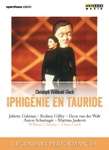|
Back
02/22/2017
Christoph Willibald Gluck: Iphigénie en Tauride
Juliette Galstian (Iphigénie), Rodney Gilfry (Oreste), Deon van der Walt (Pylade), Anton Scharinger (Thoas), Martina Jankova (Diana), Chorus of the Zurich Opera House, Orchestra “La Scintilla”, William Christie (conductor), Claus Guth (stage director)
Filmed live at the Zurich Opera (2001) – 108’
Arthaus Musik DVD 109192 or Blu-ray 109193 – Subtitles in Italian, English, German, French, and Spanish

   
I suspect this production is more enjoyable on film than it was on the stage. Claus GUth’s production presents a flurry of styles and approaches that can mostly be ignored thanks to the extensive use of close-ups on a cast that benefits from such close scrutiny. (This cannot be said of all singers.) Musically it is very fine: the three main singers are excellent, and the orchestra “La Scintilla” under William Christie is a dazzling delight.
The presence of the singers is amplified by four oversize masked figures representing Iphigénie, her brother Oreste, her father Agamemnon and her mother Clytemnestra. We see the background story played out as the embers of the House of Atreus repeatedly re-enact the cycle of murder, recrimination and revenge. There are moments when a masked double intrudes on the action, but this doesn’t fatally harm the experience.
The main drawback is that the key dramatic moment, when Iphigénie finally recognizes her brother, is not given its due focus - it whizzes by in a split second. One might blame Gluck who simply failed to give the moment anything like what Richard Strauss did for the recognition scene in Elektra. However more focused stage direction would have helped.
Benefiting most from the close filming are the ardent performances of the two men, Rodney Gilfry as Oreste and Deon van der Walt as Pylade. (His performance is a nice testament to the memory of the tenor, whose death in 2005 was like something out of Greek tragedy.) Juliette Galstian’s Iphigénie has a cooler, more detached presence, almost like someone in a trance. This is effective, too, if one thinks of her character as someone held prisoner while being made to preside over barbaric religious rites. Anton Scharinger adds to the tension as the fearful, haunted Scythian king, Thoas.
Michael Johnson
|